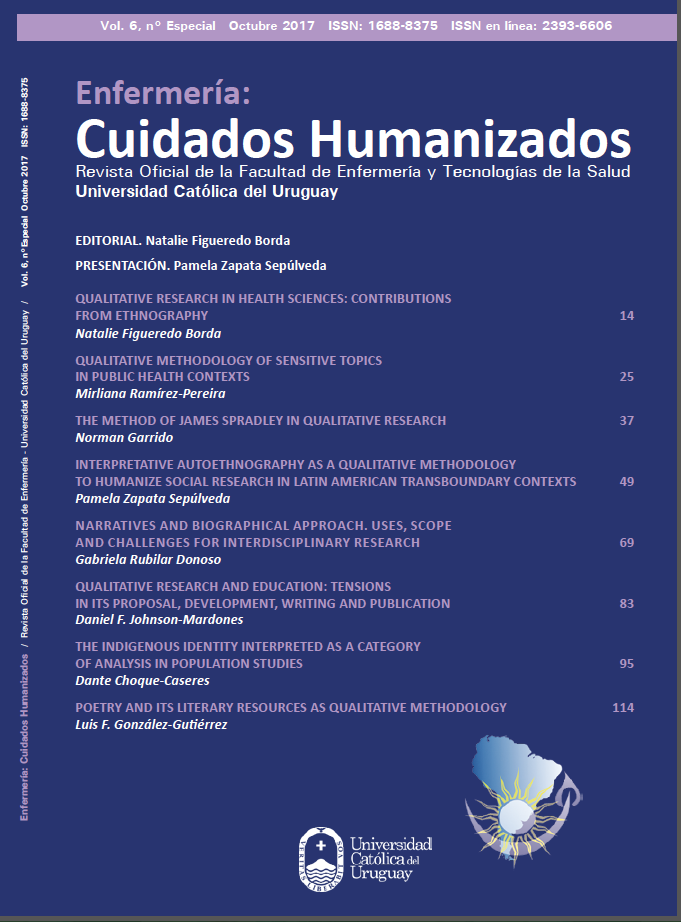QUALITATIVE METHODOLOGY OF SENSITIVE TOPICS IN PUBLIC HEALTH CONTEXTS
DOI:
https://doi.org/10.22235/ech.v6iEspecial.1447Keywords:
Qualitative Research, Public Health, Researcher-subject Relationship.Abstract
Subjectivity is always present in qualitative methodologies where emotions, feelings, culture and background of participants and researchers are involved. This is especially relevant in the health area, where sensitivity is present in many of the topics addressed. According to Lee, sensitive topics are those where research invades the private sphere, digs into some deep and personal experiences, addresses deviation or social control, and affects the interests of powerful people and/or the execution of coercion and domination. The following article is divided in two parts: the first one is related to theoretical foundations of the study of sensitive topics in public health, from the perspective of participants and the research team, revealing the importance of safety and physical, psychological, moral and legal security of all the members involved. In the second part, the author reflects upon her experience in investigation of sensitive topics, and, finally, methodological strategies are proposed to address the study of these subjects.
Downloads
References
2. Lee R. Doing Research on Sensitive Topics. California: Sage Publications; 1993.
3. Sieber JE, Stanley B. Ethical and professional dimensions of socially sensitive
research. Am Psychol. 1988; 43 (1): 49-55.
4. McCosker H, Barnard A, Gerber R. Undertakin Sensitive Research: Issues and Strategies for Meeting the Safety Needs of All Participants. Forum Qual Soc Res. 2001. 2 (1): 1-14
5. Finch J. It s great to have someone to talk to: The ethics and politics of interviewing women. In: Bell C, and Roberts H, Eds. Social researching: politics, problems, practice. London: Routledge & Kegan Paul; 1984. p.79-88
6. Oakley A. Interviewing women: a contradiction in terms. In: Roberts H, Ed. Doing feminist research. London: Routledge & Kegan Paul; 1981.p. 30-62
7. Berger R. Disability and Life History Research an Autoethnography of Qualitative Inquiry. Int Rev Qual Res. 2016. 9 (4): 472-488.
8. Ashton S. Researcher or nurse? Difficulties of undertaking semi-structured interviews on sensitive topics. Nurse Res. 2014; 22 (1): 27-31.
9. Elmir R, Schmied V, Jackson D, Wilkes L. Interviewing people about potentially sensitive topics. Nurse Res. 2011; 19(1): 12-16
10. Petersen A J. Research with individuals labeled ‘‘other’’: Reflections on the research process. Disabil Soc.2011; 26:293–305.
11. Janesick V. Contemplative Qualitative Research. Walnut Creek (California): SAGE; 2015.
12. Cowles K. Issues in Qualitative Research on sensitive topics. West J Nurs Res.1988; 10(2): 163-179.
13. Dickson – Swift V, Lyn E. Undertaking Sensitive Research in the Health and Social Sciences: Managing Boundaries, Emotions and Risks. New York: Cambridge University Press; 2008.
14. Dickson-Swift V, James E, Kippen S. Blurring Boundaries in Qualitative Health Research on Sensitive Topic. Qual Health Res. 2006; 16(6): 853-871.
15. Manders G, Galvani S. Learning from the Research Process: Discussing Sensitive Topics as a Cultural Outsider. Social Work Education. 2015; 34 (2): 199-212.
16. Valles M. Técnicas cualitativas de Investigación social. España: Síntesis.1999
17. Escudero JA. La actualidad de la fenomenología husserliana: superación de viejos tópicos y apertura de nuevos campos de exploración. Eidos. 2013; 18 (Jun-Jul): 12-45.
Downloads
Published
How to Cite
Issue
Section
License
Copyright (c) 2017 Enfermería: Cuidados Humanizados

This work is licensed under a Creative Commons Attribution 4.0 International License.

















